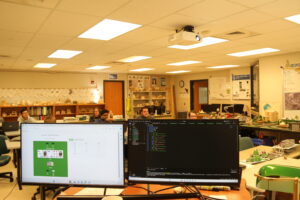The Elizabethtown College Computer Science (CS) Club hosted a series of engaging coding challenges during the fall semester, aimed at providing opportunities for students to use their skills to find creative and innovative solutions.
“Challenges like these promote a sense of community among Etown Computer Science students, encourage innovation and problem-solving, and expose students to real-world challenges and solutions,” Ethan Lajeunesse ’24, a Computer Science major and President of Etown’s Computer Science Club said.
The first event featured a monthlong coding challenge in October sponsored by the Clark Associates Charitable Foundation. Teams of students were tasked with finding creative solutions to pressing computer science-related issues, including cybersecurity. Three winners were selected by a panel of judges composed of Etown professors and awarded prize money of varying amounts.
James Buck ’26 won the challenge with his project, “Password Security Checker,” which informs users about the security of their password and how commonly it is used. Second place was awarded to Steven Klinefelter ’25 with his project, “OmniPi.” Klinefelter developed a small-scale omnidirectional robot with custom parts, specifically coding the control system to manage its movements. The third-place winner was Giovanni Raso ’24 and Muzahidul Islam’s ’25 project, “Gone Phishing,” which provided a tool to address the critical need for a simple, effective, and accessible means of ensuring website security.
The second challenge in November, which was co-hosted with Etown’s Robotics and Machine Intelligence Club, was the Python Poker Artificial Intelligence (AI) competition. Python is a computer programming language often used to build websites and software, automate tasks, and conduct data analysis.
Before the competition, the Computer Science Club held a workshop introducing students to a Python Poker program that allowed users to create AI bots to play poker. Students updated the code and provided bug fixes, then coded the logic of a poker player into their bot. In a two-hour competition, students were put into groups as the bots went against each other in poker rounds.

During the Python Poker AI challenge, students created their own poker bots and pitted them against each other.
The final competition took place from Oct. 18 to Nov. 18, and students were given categories to code from, including AI, finance, and environmental coding, along with code that would benefit Elizabethtown College.
The competition was judged by an alumni board and included Allyson Nace ’21, Matthew Grohotolski ’22, Nate Mansfield ’23, and Brian Stottler ’18. Judges looked for competency, creativity, and complexity.
The winner of the competition was Data Science major Yusuke Satani ’25 who entered the AI category and created a project that accurately recognizes Japanese characters to automatically generate educational flashcards that streamline Japanese language learning.
The competition was partially sponsored by Google who provided funds for refreshments at the event, as well as a Visa gift card to the winner. Etown’s Computer Science Club is part of the Google Developer Student Club Program, which provides community groups for higher education students interested in Google Developer technologies.
The club will host more coding challenges in the spring semester.

